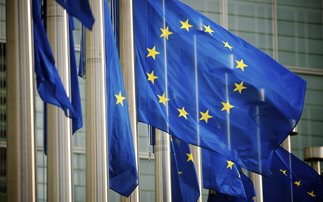It may have been overshadowed by another dramatic day in Westminster, but yesterday the government was effectively accused of a dereliction of duty in the face of the climate crisis
There is nothing surprising about the Committee on Climate Change's (CCC) latest update on the UK's response to escalating climate threats, but that does not make it any less shocking.
The two progress reports released today assessing the government's efforts to cut emissions and enhance climate resilience really should trigger a national-level scandal that demands an immediate and urgent response. The only problem is they have to take their place in today's queue of national level scandals, such is the level of humiliating dysfunction that now stalks Westminster.
Like gridlocked buses on a smog-choked street, you wait ages for the inadequacy of the government's response to the existential climate threat to be officially recognised, only for it to pull up behind the mortifying sight of the US President effectively sacking the British ambassador to Washington as the likely next Prime Minister offers his subservient approval, and the Labour Party shredding what remains of its credibility with efforts to silence ex-employees concerned about its handling of antisemitism cases.
Depressingly, the CCC's battle for space in another hurricane-level news cycle goes a long way to explaining why the government's official climate advisors did not have better news to report today. Depending on which quote you opt for, the watchdog's analysis reveals the UK's broad climate efforts are "ramshackle", "shocking", "damning", "abject", "dismal", reminiscent of "Dad's Army", and, my personal favourite, like deciding you want to win Wimbledon but then refusing to pick up a tennis racket. You can be sure that privately, the assessment from many leading green business figures is even more brutal.
The government would love to push back against much of this criticism. After all the UK does have an impressive decarbonisation track record compared to most industrialised countries and has engineered a rapid transformation of the power grid over the past decade. But the official response was remarkably muted, simply emphasising once again that "there is more to do" and plans to enhance climate resilience and tackle emissions from aviation, heat, energy, and transport are, as ever, in the pipeline.
The promise of imminent new policies is, of course, hugely welcome, just as it has been welcome throughout the entire two year period since the government's Clean Growth Strategy first floated the idea new measures were in the pipeline. The problem is that without a drastic step change in the government's engagement with climate-related issues - a step change, lest we forget, that will have to be delivered by an entirely new Cabinet that is set to be immediately overwhelmed by the next phase of the rolling tragi-comedy of Brexit - it is difficult to envisage these new policies delivering the scale of emissions cuts that are required.
The CCC report is explicitly clear on the scale of the current failings. The UK is on track to miss current medium term carbon targets by a widening margin, even before the need to upgrade those targets to bring them into line with a net zero emission trajectory are considered. Of the 25 policy measures recommended this time last year to help close the gap, just one has been enacted. Cross-Whitehall governance measures remain glaringly inadequate, with common sense proposals for a new net zero committee bringing together all relevant departments still gathering dust on a shelf. The UK's climate resilience strategy, such as it is, remains badly flawed even as threats to lives and livelihoods worsen. This is real dereliction of duty stuff.
Perhaps worst of all, the report highlights for the umpteenth time how the government is failing to undertake the relatively simple steps that would deliver short term emissions savings. The route to market for cost-effective onshore renewables remains strewn with barriers, energy efficiency schemes remain criminally underfunded and building and renting standards are still too lax and rarely enforced, higher rates of VAT are about to get slapped on solar systems, and corporate climate reporting rules seem purposefully designed to create an uneven playing field. Meanwhile, R&D and early stage deployment programmes for green aviation, green heat, and carbon capture technologies are all badly underpowered given their absolutely critical long term importance.
The big question prompted by this chronic underperformance is why? When everyone knows where the problems lie and there is broad agreement amongst businesses, investors, campaigners, and policy experts as to what needs to be done, why is more progress not being made?
There are many plausible explanations - Brexit eating up Ministerial bandwidth, the Occam's razor offered by industry lobbyists scuppering progressive proposals, fear of a media and voter backlash if decarbonisation costs escalate - but they all have one thing in common: climate action is still not a genuine political priority.
Speaking at a debate on the Green New Deal organised by the PRASEG and APPGCC groups of MPs this week, former government special advisor Guy Newey argued that for all the warm words sparked by school strikers and Extinction Rebellion, the biggest barrier to bolder climate action remained a lack of prioritisation across the UK's political leadership. His comments came just a day before Boris Johnson and Jeremy Hunt faced off in a TV debate in which climate change was not mentioned once. This morning's front pages contained little mention of the fact that the government is failing to deliver against targets that it has accepted are of near existential importance, putting hundreds of thousands of people are risk in the process.
The stark reality is that the next phase of the net zero transition will be all but impossible to deliver until climate action is embedded as a genuine top tier, think about it every day, political priority. All of which begs a further critical question: how can recent momentum be maintained so as that the net zero endeavour is properly regarded as a national priority?
There is no one simple answer to this question, but the CCC report hints at how variants of the carrot and the stick offer the best route forward.
The shiny reward that Hunt, Johnson, and Corbyn should be scrapping fiercely to seize is the promise of a hugely popular national mission that can rejuvenate the economy, enhance the UK's international standing, and improve quality of life right across the country. Johnson has somehow managed to successfully brand himself as a "peddler in optimism", but the vision for the future offered by both Conservative leadership candidates in last night's debate was just so… meh. The same old blather about tax cuts and trade and British exceptionalism all sounds so very tired, so utterly out of sync with the seriousness of the historic moment.
The promise of the UK welcoming the world to next year's UN climate summit so as to showcase its position as a modern, clean, innovative economy united by a globally significant mission and an historic sense of responsibility should be a story politicians of all stripes are rushing to tell. A government committed to reshaping the countryside, improving people's homes and towns, creating rewarding green jobs, and exporting its expertise for the good of humanity should be able to command the post-Brexit narrative and reap the electoral rewards that tend to flow from a clear and compelling story.
Conversely, various sticks loom in the guise of the emotion the British establishment used to fear most: embarrassment.
As Lord Deben observed this week, his hope is that the CCC report will trigger a response that saves the government from "the enormous embarrassment of being directed by the courts to take action" - an embarrassment that would become even more acute were it to coincide with the diplomatic disaster of a badly bungled UN climate summit. The COP26 summit has all the hallmarks of a genuinely historic moment for the UK, the first test of its diplomatic clout in the post Brexit era, coming at a time when the country's reputation for competence and strategic nous is at its lowest ebb in decades. It could go very well, or it could go humiliatingly badly. The new Prime Minister needs to absorb this reality very quickly and act accordingly. The UK will not be able to maintain its reputation as a leader on climate action unless a new wave of tangible measures are enacted - and fast.
Inevitably business leaders have a critical role to play in hammering home to their political counterparts precisely what is at stake. One of the reasons climate action is still not regarded as a genuinely top priority is that the business community, while being broadly supportive of the net zero agenda, has not spent enough of its considerable political capital on securing the reforms that are required. There are still too few top tier business leaders willing to talk repeatedly and convincingly about the climate threat and the mission critical importance of the clean tech transition. Pressure needs to be brought to bear. Ministers need to be made to feel excruciatingly embarrassed when their climate policy failures are exposed.
One of my favourite responses to the Paris Agreement came from the satirists at The Daily Show, who joked that the penalty for failing to deliver on its voluntary goals would be "1. Side eye; 2. Losing Twitter followers; and 3. Looking a bit of a dick". But those are actually three of the most potent forces in the modern world - or at least they used to be.
The populism of the Trump/Brexit era has allowed people who once bemoaned the erosion of any sense of embarrassment in public life to reinvent themselves as dissembling figures who are utterly immune to shame, charges of hypocrisy or feelings embarrassment. Now, as the CCC reminds everyone quite how badly the UK's climate efforts are faltering, it is to be hoped that the sheer embarrassment of failing to confront a national mission still wields some of the historic power it used to hold over the British elite.
A version of this article originally appeared in the BusinessGreen Overnight Briefing email, which is available to all BusinessGreen subscribers.










